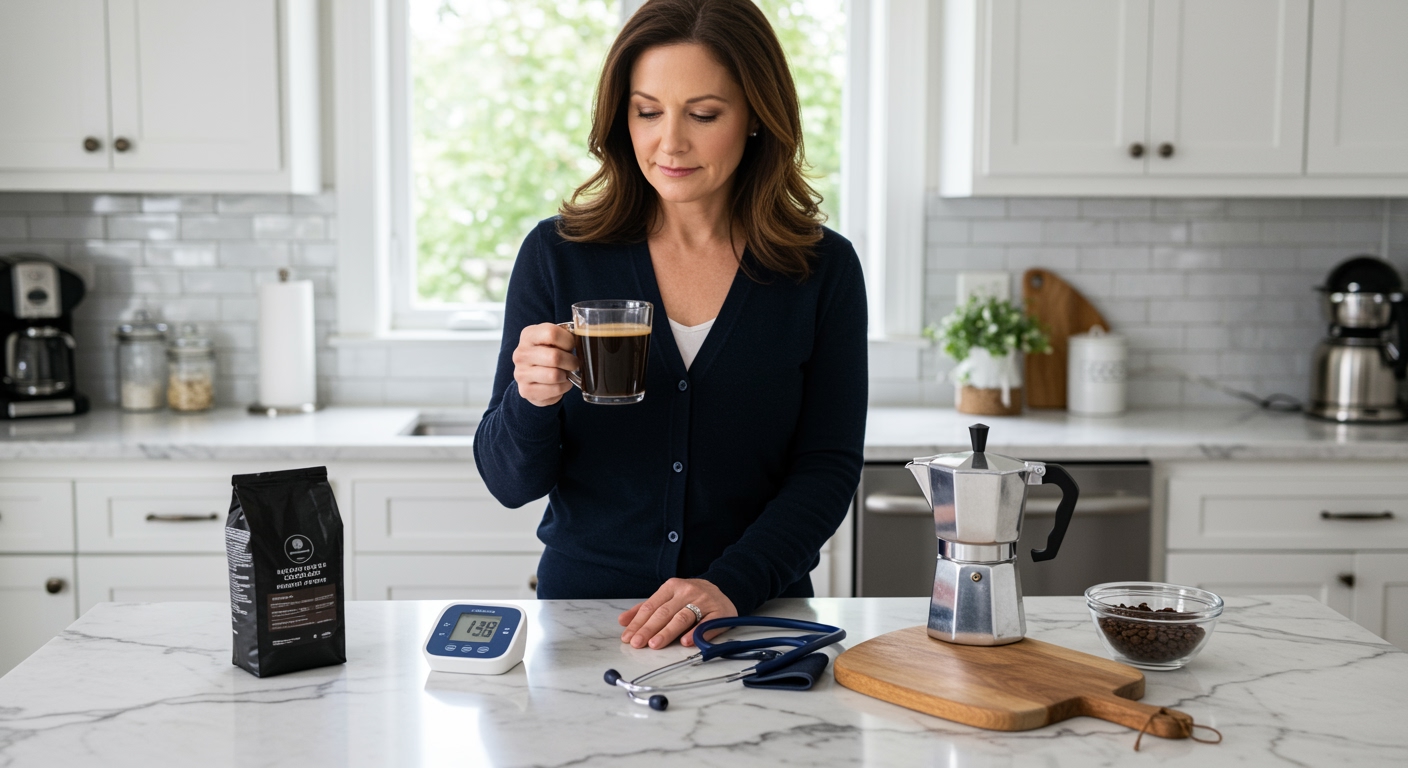✪ Key Takeaway: Black coffee can temporarily raise blood pressure but may lower it long-term through antioxidants and improved heart health.
Introduction
Your morning black coffee ritual might be doing more to your blood pressure than you think.
You probably wonder if that daily cup is helping or hurting your heart health, especially if you have been told to watch your blood pressure numbers.
Hi, I am Abdur, your nutrition coach and today I am going to explain exactly how black coffee affects your blood pressure and what this means for your heart health.
What Happens to Your Blood Pressure When You Drink Black Coffee?
Black coffee creates an immediate spike in your blood pressure within 30 minutes of drinking it.
This happens because caffeine blocks adenosine receptors in your blood vessels, which normally help keep them relaxed and open.
When these receptors get blocked, your blood vessels constrict slightly and your heart rate increases, pushing your blood pressure up by about 5-10 mmHg.
The peak effect usually occurs 30-60 minutes after drinking coffee and can last for 3-4 hours in your system.
However, your body develops tolerance to caffeine over time, which means regular coffee drinkers experience smaller blood pressure spikes than occasional drinkers.
✪ Fact: People who drink coffee regularly show 50% less blood pressure response to caffeine compared to non-regular drinkers.
Does Regular Black Coffee Consumption Lower Blood Pressure Long-Term?
Research shows that regular black coffee consumption may actually lower your blood pressure over months and years.
This happens because coffee contains powerful antioxidants called chlorogenic acids, which help improve the function of your blood vessel walls.
These antioxidants reduce inflammation in your cardiovascular system and help your blood vessels stay more flexible and responsive.
Studies following people for several years found that those who drank 3-4 cups of coffee daily had lower average blood pressure readings than non-coffee drinkers.
The protective effect seems strongest in people who drink black coffee without added sugar, cream, or artificial sweeteners.
Your body also becomes more efficient at processing caffeine, which reduces the temporary blood pressure spikes over time.
✪ Pro Tip: Drink your coffee black to maximize the antioxidant benefits without adding extra calories or blood sugar spikes.
How Much Black Coffee Is Safe for Blood Pressure?
The sweet spot for coffee consumption appears to be 2-3 cups of black coffee per day for most adults.
This amount provides about 200-300mg of caffeine, which is within the safe daily limit recommended by health organizations.
People with normal blood pressure can usually handle this amount without significant cardiovascular risks.
However, if you already have high blood pressure, you should be more cautious and consider limiting intake to 1-2 cups daily.
The timing of your coffee consumption also matters – drinking coffee late in the day can disrupt sleep, which negatively affects blood pressure control.
People with severe hypertension (blood pressure over 160/100) should consult their doctor before consuming regular amounts of caffeine.
✪ Note: Always measure your blood pressure at the same time daily to track how coffee affects your individual response.
When Should You Avoid Black Coffee for Blood Pressure?
You should avoid or limit black coffee if you have uncontrolled high blood pressure above 180/110 mmHg.
People taking certain blood pressure medications may experience enhanced effects when combined with caffeine, leading to dangerous drops in blood pressure.
If you experience heart palpitations, chest tightness, or severe headaches after drinking coffee, these could be signs that caffeine is affecting your cardiovascular system negatively.
Pregnant women should limit coffee intake to one cup daily since caffeine sensitivity increases during pregnancy and can affect both maternal and fetal blood pressure.
People with anxiety disorders often find that caffeine worsens their symptoms and can indirectly raise blood pressure through stress responses.
If you are scheduled for blood pressure monitoring or cardiovascular tests, avoid coffee for at least 4 hours beforehand to get accurate readings.
✪ Pro Tip: Keep a blood pressure log for two weeks to see how your individual body responds to coffee consumption.
The Bottom Line
Black coffee creates a temporary increase in blood pressure but may provide long-term cardiovascular benefits through its powerful antioxidants and anti-inflammatory compounds.
The key to coffee and blood pressure is understanding your individual response and drinking it consistently rather than sporadically.
I would love to hear about your experience with coffee and blood pressure in the comments below – do you notice any changes in your readings after your morning cup?
References
At NutritionCrown, we use quality and credible sources to ensure our content is accurate and trustworthy. Below are the sources referenced in creating this article:
- American Heart Association: People with very high blood pressure may want to go easy on the coffee
- PMC: Coffee Consumption and Cardiovascular Health
- Healthline: 3 Cups of Coffee a Day May Lower Blood Pressure
- PubMed: Coffee and cardiovascular disease





